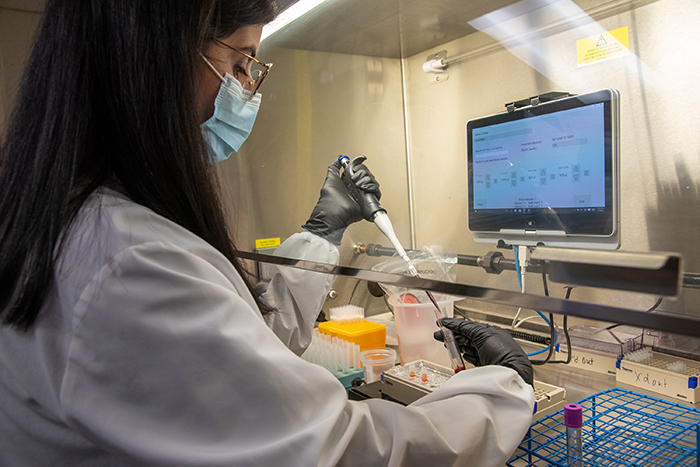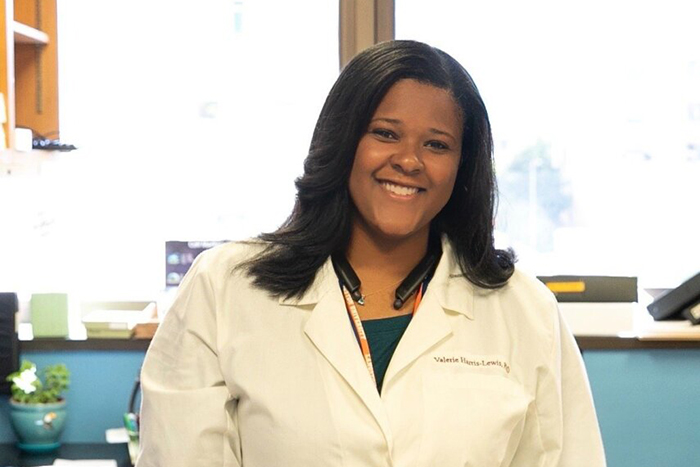Office of Research & Development |
 |
Office of Research & Development |
 |


Health science specialist Yasamin Azadzoi prepares MVP volunteer blood samples at the Boston VA. (Photo by Frank Curran)
November 9, 2023
By Tristan Horrom
VA Research Communications
Having a centralized infrastructure for recruitment and enrollment . . . can allow for expedited enrollment in vaccine and treatment trials in the face of future public health emergencies.
When the COVID-19 pandemic began in early 2020, VA’s Million Veteran Program (MVP) sprang into action to respond to the national health crisis and jumpstart COVID research. MVP not only answered critical questions about how to best prevent and treat the virus, but it also laid the groundwork to better equip the nation to respond to future public health crises.
MVP is one of the largest genetic research databases in the world, giving researchers unprecedented opportunity to study how genes, lifestyle, military experience, and environmental exposures interact to influence health and illness in Veterans. MVP director Dr. Sumitra Muraldhar and colleagues explained the important role MVP can play in the nation’s crisis response plans in a recent special issue of Federal Practitioner.

AI to Maximize Treatment for Veterans with Head and Neck Cancer

VA investigator brings diversity into autoimmune disease research

VA researcher works to improve antibiotic prescribing for Veterans
“Having a centralized infrastructure for recruitment and enrollment, including a national research volunteer registry, information center, research staff, and coordinating centers, can allow for expedited enrollment in vaccine and treatment trials in the face of future public health emergencies,” Muraldhar said.
When COVID-19 began spreading across the nation, VA already had a large-scale, enterprise-wide infrastructure set up to handle a large number of research participants through MVP, including a network of more than 70 participating sites with dedicated staff to conduct recruitment and enrollment. The department was able to quickly create the VA Coronavirus Research Volunteer List, a registry that was crucial to recruiting 1,300 Veteran volunteers for COVID-19 vaccine trials.
MVP researchers also asked volunteers to fill out a COVID-19 survey, which received more than 255,000 responses. This survey provided insights into pandemic behaviors such as social and emotional support and social distancing. The survey responses, combined with electronic health records data, allowed researchers to better understand epidemiological, clinical, and psychological aspects of the disease, which in turn helped shape the care of Veterans during the pandemic.
Beyond this rapid response work, MVP also formed six working groups to study the genome of SARS-CoV-2, the virus that causes COVID-19, and how it interacts with different gene variants in humans. This research greatly increased the scientific understanding of COVID-19 and played an important part in creating risk assessment tools and potential treatments for the disease.
Among other findings by these working groups, MVP researchers discovered genetic factors that affected the positivity and severity rates of COVID-19 based on racial and ethnic differences. One study found that variants of the APOL1 gene common in Black Veterans increased the risk of acute kidney injury in those hospitalized with COVID-19. Another showed that Veterans with the sickle cell blood trait had an increased risk of death from COVID-19. These and other discoveries by MVP researchers allowed clinicians to better assess each patient’s risks from COVID-19 and provide the most appropriate care.
The existing MVP research infrastructure also enabled researchers to leverage VA’s partnerships with the Department of Energy and the Food and Drug Administration to learn more about COVID-19. These collaborations demonstrated how VA’s enterprise approach to research and health care not only played a crucial part in a government-wide response to COVID-19, but also helped the nation prepare for any future pandemics or other public health crises.
While MVP quickly refocused to confront the COVID-19 pandemic, the work still continues even now that the national health crisis has abated. VA and DOE are launching a new joint project on long COVID that will include creating a standard definition of the condition and will work to understand the long-term effects of the disease. VA has also established a Partnered Research Program to facilitate collaborations with industry and speed up clinical trials, and MVP will continue to contribute toward expanding scientific knowledge to improve COVID-19 management as well as myriad other health conditions that affect Veterans.
MVP’s efforts to understand and protect against COVID-19, as well as other elements of VA’s response to the pandemic, are discussed in detail in the November 2023 special issue of Federal Practitioner.
VA Research Currents archives || Sign up for VA Research updates